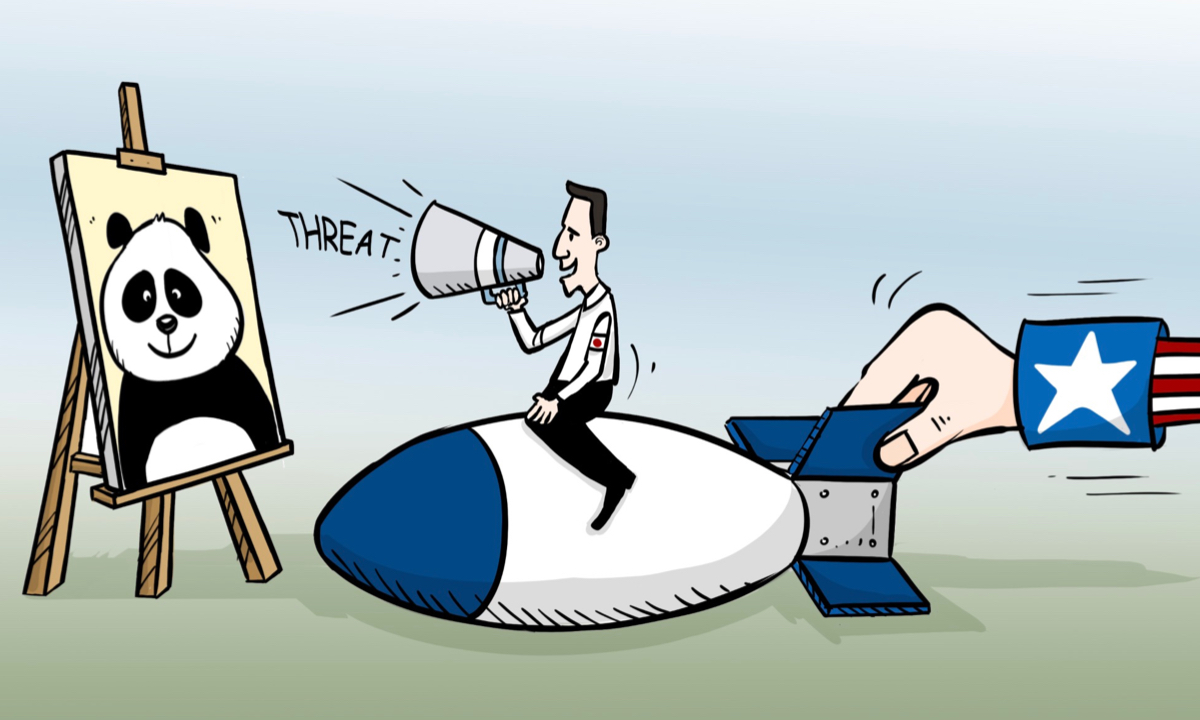
Illustration: Chen Xia/GT
The Japanese government has recently continued to take actions towards remilitarization. According to Kyodo News, Japan is considering almost tripling the number of units in its Self-Defense Forces equipped with ballistic missile interception capabilities in the country's remote southwestern islands by the end of the fiscal year of 2031. The Yomiuri Shimbun newspaper reported that the Ministry of Defense is considering establishing a group within the Ground Self-Defense Force to defend the Nansei island chain, comprising Okinawa prefecture and parts of southern Kyushu. The Jiji Press said Japanese Prime Minister Fumio Kishida instructed defense and finance ministers to earmark some 43 trillion yen for defense spending over the five years from fiscal 2023. What is the purpose of Japan's military moves? Are they aimed at China?
First, Japanese public's perception of China is mainly negative. China and Japan are neighbors with close economic, cultural and trade ties. However, the two countries have complex contradictions due to many historical and practical issues. As China's strength and influence continue to increase with the reversal of the power balance between two countries and the strengthening of US strategic competition with China, Japan's perception of China is increasingly negative.
Second, most of Japan's military actions are related to China, which includes the measures mentioned above. Establishing a group within the Ground Self-Defense Force is to improve the defense capabilities of the Japanese Self-Defense Forces near Taiwan island so that"if there is a contingency,"Tokyo can respond to it. The expansion of the ballistic missile interception force in Okinawa is aiming to counter the development of hypersonic weapons advanced by ChinaandRussia.
Third, aversion toward China does not necessarily mean confrontation with China. The Japanese government's perception and policies toward China cannot be considered friendly, but the relevant official documents do not indicate that Japan seeks to confront China directly. The fundamental reason is that the relative power positions of China and Japan have been reversed, with China increasingly and far surpassing Japan in terms of economic scale and military power.
Fourth, Japan's security strategy relies on the US-Japan Alliance. As a defeated country in World War II, Japan has been restricted militarily and politically. Politically, it has been "moulded" by the US; militarily, it is an ally of the US; and its security is also protected by the US. Japan has long relied on the US-Japan Alliance as the cornerstone of its security and diplomacy, but in recent years it has been seeking to strengthen its own military power.
Fifth, Japan's fundamental goal is to become a "normal country." After World War II, with its economic recovery and growth, domestic nationalist sentiment has grown. Accordingly, it gradually established a national strategic goal, that is, by amending the constitution, establishingits own army, and changing its "economic giant but political dwarf" state andfinallybecoming a "normal country." This goal is also embraced by the present administration.
Sixth,Japan's specific strategy is to promote military expansion by hyping up the "China threat." The Japanese government has negatively evaluated China inthe National Security Strategy, the National Defense Program Guidelines, and the 2021-2025 Mid-term Defense Plan and hyped up the "China threat." This approach, in essence, is to take the opportunity to strengthen Japan's military deployment and enhance its military power so as to prepare for the realization of its fundamental national strategic goals.
In a word, Japan's recent military moves are all related to China. However, it does not seek direct military confrontation with China, but rather to strengthen its own military power through hype so that it cannot only meet the deployment needs of the US strategy toward China but also promote Japan's fundamental national strategic goals. However, Japan's actions are irrational and not conducive to regional peace and stability. As a defeated country, Japan kept the upper limit of its annual defense budget at about 1 percent of GDP for a long time, which is regarded as a key indicator of Japan's pacifism. But the Kishida government has decided to increase defense spending to 2 percent of GDP or more over the next five years.
As Chinese Foreign Ministry Spokesperson Mao Ning said, Japan's defense budget has increased for 10 years in a row and Japan is also prone to playing up regional tensions and seeking military breakthroughs, adding that such dangerous moves have aroused strong doubts among its Asian neighbors and the international community about whether Japan can stick to an exclusively defense-oriented policy and path of peaceful development. Japan should seriously reflect on its history of aggression, respect the security concerns of its Asian neighbors, speak and act prudently in the military and security fields, and do more things conducive to maintaining regional peace and stability.
The author is an associate research fellow with the National Institute of International Strategy at the Chinese Academy of Social Sciences. opinion@globaltimes.com.cn
